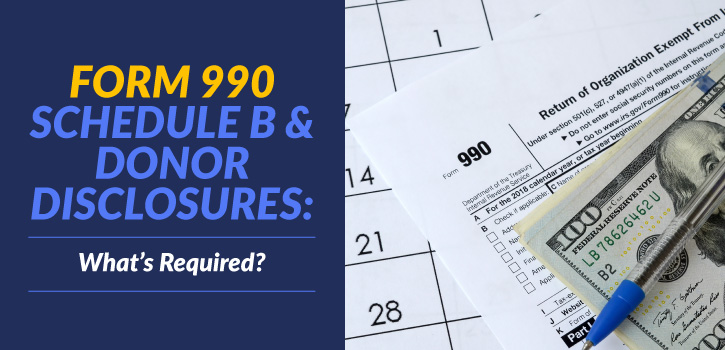Form 990 Schedule B & Donor Disclosures: What’s Required?
The nonprofit regulatory landscape is constantly changing. New requirements can appear over time, and others might disappear, leaving your nonprofit the task of figuring out exactly what’s required in order to stay compliant all while securing funding, engaging donors, and running programs.
Recent developments regarding the Form 990 Schedule B, major donor disclosures, and how it all relates to state-level nonprofit compliance are a perfect example.
You’re already familiar with IRS Form 990—a simple report that gives the IRS a birds-eye view of your organization’s financial activities over the past fiscal year. But what’s the Form 990 Schedule B? Is it required for your nonprofit? If you’ve provided a complete Schedule B to state charity offices when renewing your registrations in the past, a recent Supreme Court ruling has likely changed what’s required of your nonprofit.
It sounds like a lot to take in, but we’ve got you covered. This quick guide will explain everything you need to know about this important development in the nonprofit compliance world.
Understanding the Form 990 Schedule B
The Form 990 Schedule B is an additional document that your nonprofit may have been required to complete and return alongside your main Form 990 (or an EZ variant) in the past.
Schedule B requires you to disclose donors who contributed more than $5,000 or an amount larger than 2% of your total donation revenue in the past fiscal year. In other words, it asks nonprofits to disclose the names and contact information of their mid-level and major donors.
The purpose of collecting this information is that it aids with fraud detection at the federal level. This is why several states have historically also required Schedule B as part of their charitable solicitation registration processes for nonprofits. However, these requirements have quickly changed following a 2021 Supreme Court ruling.
Americans for Prosperity Foundation v. Bonta (2021)
The Supreme Court’s ruling in the 2021 Americans for Prosperity Foundation v. Bonta case has effectively eliminated the use of Form 990 Schedule B in state-level charity registrations.
Americans for Prosperity Foundation and the Thomas More Law Center challenged the state of California’s requirement that nonprofits submit a completed Schedule B and disclose their major donors on the grounds that doing so violates donors’ first amendment rights to free speech and assembly. They argued that it was an unnecessary collection of personally identifiable information. California defended its collection of Schedule B information as a means of fraud detection and consumer protection.
The Supreme Court ruled 6-3 in favor of Americans for Prosperity Foundation, finding a lack of compelling evidence that donor disclosures drive greater fraud detection results at the state level. The Court’s majority opinion stated that subpoenas and audits remain effective and are potentially more efficient options for state investigations than broad data collection through Schedules B.
The decision struck down California’s regulation requiring nonprofits to submit a Schedule B as part of their charitable solicitation registration with the state’s Attorney General’s office.
What it Means for Your Nonprofit
So what does this mean for your nonprofit and its compliance requirements? There are two key takeaways:
- As of the time of writing (April 2022), nonprofits are no longer required to provide Form 990 Schedules B as part of their registration or renewals process with states that previously required them. These states include New York, New Jersey, California, and Hawaii, all of which have either removed Schedule B requirements or stated that they will not enforce these requirements since the 2021 ruling.
- Importantly, you are still required to file a Schedule B alongside your Form 990 at the federal level if you have received large gifts that fall under its guidelines. The IRS requires this information for fraud detection purposes, but all personally identifiable information is redacted from the publicly available documents that are published.
These changes only affect nonprofits that were already operating and registered in the states listed above, but they do underscore the need for constant compliance and effective recordkeeping.
Even as states remove requirements for donor disclosures, it’s important to remember that they still have a public duty to prevent charity fraud and protect consumers, which is the entire purpose of the solicitation registration process in the first place. Thorough records on all donations you receive in a secure, organized CRM will be your best bet for maintaining transparency and protecting your mission should an investigation ever occur.
More broadly, these changes reflect the continued importance of staying aware of changing nonprofit requirements.
The landscape is constantly shifting, so understanding your requirements at the federal level, state level, and where they intersect and change over time is essential. And as nonprofits increasingly grow into the world of digital marketing and explore new revenue streams, unfamiliar compliance and privacy requirements will only become more important.
By filing the necessary documentation, renewing registrations, hiring registered agents as needed, and more, you’ll safeguard your mission for years to come. The help of attorneys and nonprofit compliance experts is also invaluable whether you’re navigating a new situation or simply want to take a proactive approach to compliance—an approach that’s highly recommended considering the relative speed at which regulatory changes can occur.

Author: Franklin Asongwe, Marketing Director, Labyrinth Inc.
Franklin Asongwe is the Marketing Director of Labyrinth, Inc. — the leading provider of state fundraising registration support and other nonprofit compliance services. He’s passionate about helping nonprofits better understand the complex compliance landscape so that they can keep pursuing their missions safely and sustainably.


